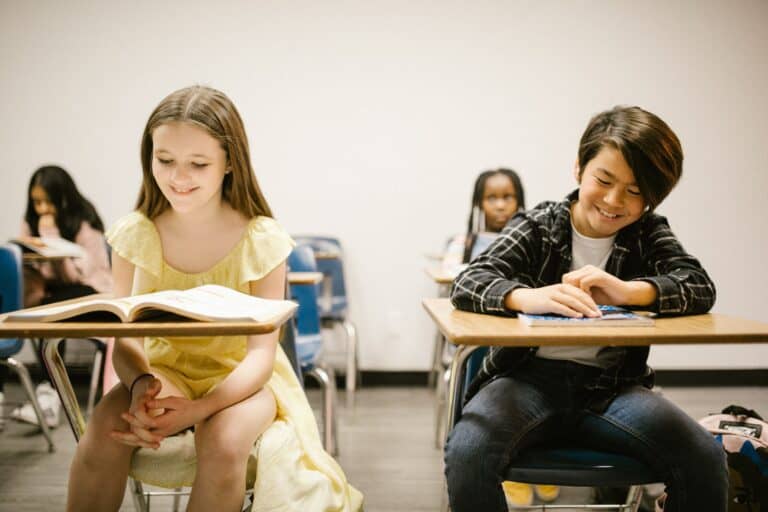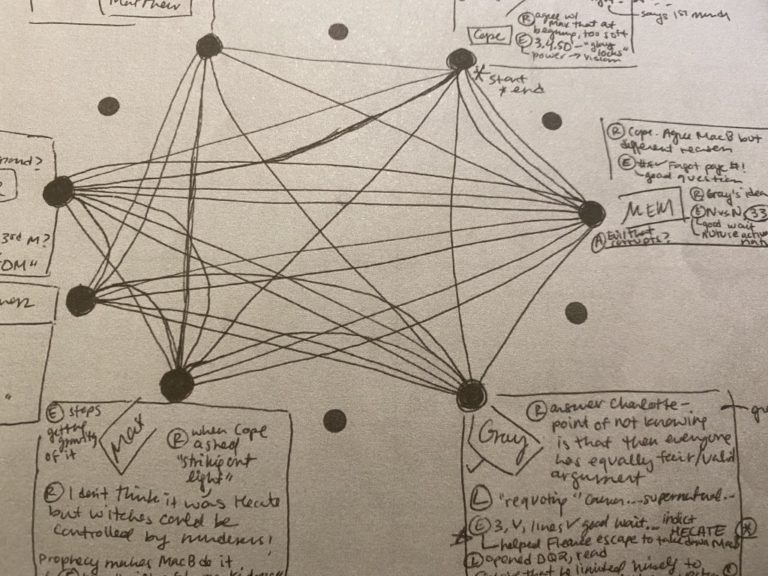Teacher Feature: Sydney Freibaum & Jennifer Cordero
Thank you to Sydney Freibaum & Jennifer Cordero for sharing their REAL lives with us! Sydney and Jennifer are sixth grade teachers at Hutchison School in Memphis, TN. Here are their thoughts on discussion, R.E.A.L.®, and learning.
Names/Hometowns:
Sydney Freibaum, Memphis
Jennifer Cordero, Memphis

Current School:
Hutchison Middle School, where Sydney teaches sixth grade English and Jennifer teaches sixth grade social science.
Can you describe yourself as a student in three words?
Sydney: Quiet, outgoing, and hilarious.
Jennifer: Perfect teacher’s pet. I was the little girl from School of Rock. The one who would say, “Um, did you forget to give us our homework assignment?”
Sydney: You would have been the “L is for Listen” facilitator.
Jennifer: Absolutely.
Who was your favorite teacher, and why?
Jennifer: My fifth grade teacher, Mr Ditchfield. He had a very interesting way of doing things that embraced a lot of student choice. This was not really a thing in the 80s, when he was teaching. He was a laid-back guy, but he was so organized about our learning. Everything had a purpose. He instituted flexible seating before flexible seating was a thing, he let you work at your own pace, he individualized everyone’s math. He gave the class time to read. He was a beekeeper, and there was a beehive in the classroom. He was fantastic.
Sydney: My favorite teacher was Ms. McCauley. She taught me several AP HIstory classes in high school. Her personality was very much that we are here to work, and we are going to get a lot of work done, but she was not afraid to laugh. And – she made you feel really proud of your nerdiness, which I thought was so cool.
When it comes to class discussion, what is your “why?” What feels compelling and important about teaching these skills?
Sydney: My “why” is seeing the girls start to think in a different way. A lot of times in English class, you get used to memorizing grammar rules and literary terms. Then in middle school, you have to make a complete adjustment, where you have to understand how those things interact in the text, ponder what the author was thinking, analyze what message the author was trying to convey. I think the best way to get kids to think about that is through discussion. Even if the first thing that comes out of their mouths is completely off-base, they really talk it out together and ultimately reach the point you need them to reach.
Jennifer: For me, it’s twofold. One is: I need these girls to someday be leaders. We need them to grow up so they can be civic-minded and change the world. When I look at them, I think to myself: this really is the generation that will have to bear the brunt of whatever is going on in the world today. So, what can we do today that will set them on the course to do something great?
In my class, because it’s ancient history, you have to make a lot of ties to how that relates to what’s going on in the world today, which can be challenging sometimes. But we talk about how people fought for citizenship, and how sometimes women had rights and sometimes they didn’t, and the girls start to go, “hey, wait a second, that sounds familiar.” And when that moment happens, that’s when you know you’ve done something.
We’ve started intentionally, purposefully teaching them how to have those formal discussions. And informally, I’ve seen how that translates. They’re looking for evidence now, and that’s what we’re trying to do: teach them to question everything.
Thinking back to your first R.E.A.L. ® discussion, what were you worried about going into it? Did anything surprise you?
Sydney: I really worried about it. We’d been doing Socratic seminars, and they were great. But really, I wasn’t hearing from as many girls, and sometimes the girls would try and talk over each other.
I was worried that it would take them a really long time to adjust to the R.E.A.L. ® discussion methods, especially since they were coming from a structure where they were just letting it fly. But I was surprised by how quickly they adjusted to it, and how excited they were that there was a structure to help them pop into the conversation.
We do informal R.E.A.L. ® discussions on a daily basis for about 10 minutes. And I’m surprised by how even though we do this daily, the girls aren’t bored by it – they want to do it every day. Now that I’ve done R.E.A.L. ® for a little while, I fully know that it works, and I love it. And for the girls, it doesn’t feel like work – it feels organic.
Jennifer: I was worried about how I was going to engage students who were disengaged. I was worried about the students who don’t feel like they necessarily don’t have a lot to say, for whatever reason. But I will say throughout the process, I saw much more leveling of the playing field. I did see girls start to understand that airtime needs to be shared. And I saw other girls who had struggled to speak learn that saying something really isn’t that hard – they just need to listen, then make a comment or ask a question.
As a team, how do you go about planning for R.E.A.L. ® discussions? How have you figured out how to work with one another to make sure there’s alignment across your content areas?
Sydney: One thing we figured out last year is that the questions we ask the girls have to be different. So I’m focusing more on literary analysis, and Jennifer is focusing more on social sciences. Our major R.E.A.L. ® discussions are more spread out: we don’t have two major graded discussions on the same day.
Thinking back on the past year, was there a moment where a student had a breakthrough that really stuck out to you?
Jennifer: I’ve had a couple of those. Like I said: it can sometimes be hard to engage students in ancient world history and to help them understand how it connects to current events. Last year, our very last R.E.A.L. ® discussion was: what does it all mean? Why did I just take a year of your time teaching you about statues and dirt and artifacts?
During the discussion, I had a couple of girls who said things that kind of took my breath away. One said: “one thing that stuck out to me that I’d never thought about was that Jewish people have been kicked out of every single place they’ve ever lived.” Her takeaway was that she can now better understand some of her Jewish friends, who often talk about their history. And I was not ready for a sixth grader to connect all that.
And another student said: “I think it’s funny that women sometimes had rights, and sometimes had no rights. But at the end of the day, men were making the decisions about women – and they’re still doing it.”
It was pretty humbling to sit in that last discussion and hear them put things together that I hadn’t even consciously intended for them to connect.
What is your go-to reward for grading a big pile of homework?
Jennifer: I always make time to read every day. I’ll reward myself with a book, or I’ll try to set a goal for the future.
What inspires you?
Jennifer: I get really motivated by any story where someone with humble beginnings does something incredibly through pure determination. I tell my girls: any of you is capable of that. I think it’s incredibly important for girls to know that.






